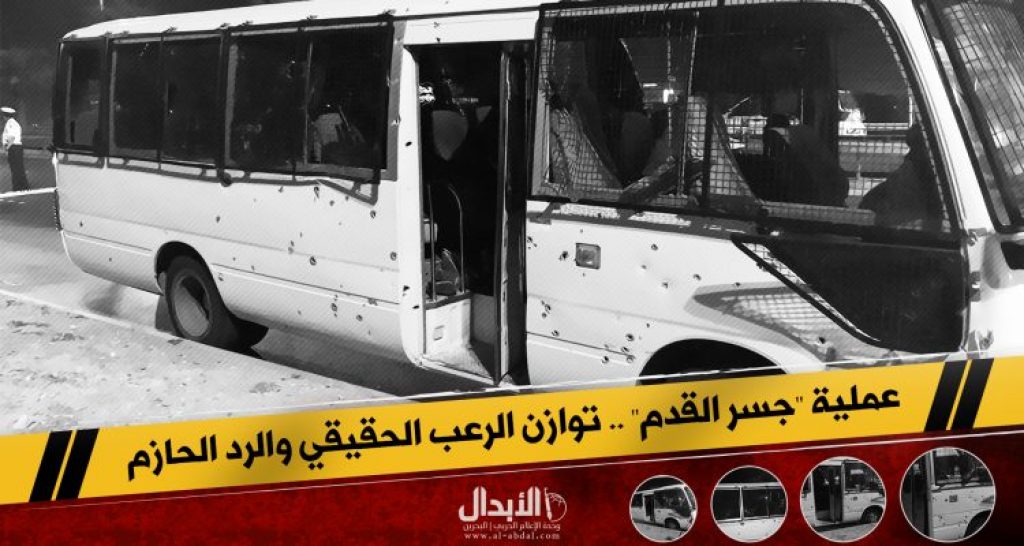
The police bus that was targeted by an IED near Manama last month, as released by social media affiliated to the “Islamic Resistance in Bahrain”
Officials in Bahrain recently placed blame on Iran for training a militant cell on how to manufacture bombings and other attacks in the small Gulf kingdom.
Last month, one police officer was killed, while another eight were wounded by an improvised explosive device on the Khilafa bin Salman highway near Manama on Friday, Oct. 27. Yesterday, Bahrain’s interior ministry said that “the terrorist cell received extensive training in Iranian Revolutionary Guard camps on the use and manufacture of explosives and firearms, as well as material and logistical support.”
Bahrain did not say which group was responsible for the bombing, but Saraya Waad Allah, a Shia militia in Bahrain, claimed the attack according to social media pages linked to the “Islamic Resistance in Bahrain.” In addition, Saraya al Mokhtar, an Iranian-supported militia that also operates in Bahrain, praised the terrorist attack on Bahraini policemen.
“The Islamic Resistance in Bahrain – Saraya al Mokhtar – congratulates our comrades in Saraya Waad Allah in their proper and blessed operation which tasted the enemies of God…who have long been tormented by our resistant people and the oppressed,” Saraya al Mukhtar’s statement reads. It also called on people to join their resistance to “save us from the cowardly occupation that hired foreign mercenaries to kill our rebellious Muslim people.”
The Oct. 27 attack was the second bombing claimed by Saraya Waad Allah last month. On Oct. 2 it claimed another IED bombing which wounded five policemen on the Budaiya highway near Manama.
Both Saraya Waad Allah and Saraya al Mokhtar are among several Iranian-backed militias operating in Bahrain. Bahraini authorities have accused Saraya Waad Allah of being a front group for Saraya al Ashtar, one of the largest Iranian-supported groups in Bahrain, but that remains unconfirmed.
Saraya al Mokhtar has been very vocal about its support of various Iranian proxies in Iraq on social media. Last October, it tweeted in support of Saraya al Khorasani, as well as photos of one of its commanders visiting the graves of killed Kata’ib Imam Ali fighters. Members of Saraya al Mokhtar were also photographed parading with these same proxies in Iraq, while other photos allege to show Bahraini militants on the battlefield in Iraq.
Earlier this year, the US State Department designated two members of Saraya al Ashtar as global terrorists. State noted that one of the individuals, Hasan Yusuf, is an Iran-based senior member of the group. Bahraini officials have accused the group of receiving training in improvised explosive devices (IED) from the Hezbollah Brigades, a US Treasury designated Iranian-backed Shiite militia in Iraq.
In Jan. 2016, a cell linked to Ashtar Brigades was arrested by Bahraini authorities. According to officials, the two-person cell was planning to execute “a series of dangerous bombings” in Bahrain. They traveled to Iran on several occasions for financial and logistic support with the IRGC. In 2012, Bahraini authorities allege the Ashtar cell members met with Hezbollah chief Hassan Nasrallah in Lebanon and received $20,000 “in support of their organization.”
In recent years, Iran has redoubled sponsorship of militant groups in Bahrain. Bahraini security forces have intercepted large quantities of advanced Iranian weapons shipments and explosives, including armor-piercing explosively formed penetrators (EFPs). Since 2015, Manama has detained dozens of Bahraini nationals linked to the IRGC and Lebanese Hezbollah.
In March, Bahrain announced the arrests of 25 suspects who were part of a “terrorist organization” that had operations in Iraq and Iran, according to Bahraini officials. Those arrested included 10 former inmates who escaped Jaw prison in a sophisticated operation in January in which perpetrators employed reconnaissance drones. [See FDD’s Long War Journal report, US designates Iran-backed Bahrainis as terrorists.]







